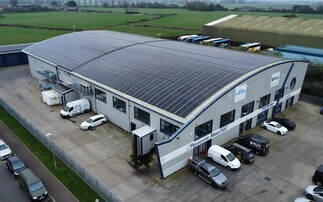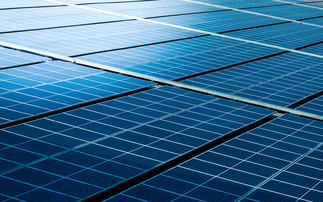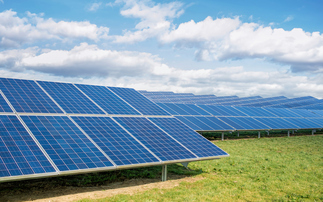The founder of SolarAid pays tribute to Hermann Scheer, the architect of the feed-in tariff
SolarAid and SunnyMoney recently won the Euro Solar award, what do you think others can learn from that model?
SolarAid and SunnyMoney believe that modern economies can, and will, be run by renewables in the future, and we're proving it one solar light at a time.
The giant mission that SunnyMoney's soaring sales are in danger of proving feasible - eradicating the kerosene lantern from Africa by 2020 - is a standard-bearing microcosm of the wider prospects for clean energy to replace fossil fuels, with all the multilayered social good that will entail.
Who has inspired you in the solar industry?
I can identify one man as having been a key trigger in the primacy of the Germany solar experience. Hermann Scheer, a Social Democrat politician who was the architect of the feed-in tariff and drove it through the Bundestag.
A giant of a man, in terms of vision, energy, and charisma, he was, among many other things, the founder of Eurosolar. Now Germany, with 84 per cent of the population polled as wanting to shift the power supply to 100 per cent renewables "as quickly as possible'', is leading the global charge to renewables and we have him to thank for it.
I hope one day we'll be talking about the hard work of SolarAid and SunnyMoney in the same way, having done for Africa what Hermann did for Germany and Europe.
Where do you see the solar market going over the next decade?
It's going to grow, and keep growing - sunshine is free and we're going to see emerging markets leap frogging complex grid process and moving straight to decentralised community based solar energy systems. Almost half of all German renewables are owned by individuals and communities and I think this will be the way the global market moves too.
The cost of solar is decreasing and the price of using fossil fuels is rocketing both for pockets and the planet. Solar will have to become normal. The price of a solar module has fallen 80 per cent since 2008, and the US Energy Department projects a further 75 per cent further price reduction by 2020. Solar is set to become the biggest single energy source in the world. Do not take my word for this. This is Shell's opinion, even as they try to transform themselves into a gas company, having given up on solar, like BP.
There is the climate imperative for going solar, nations will have to decarbonise their energy sectors fully by mid-century. This can be done by deploying a mixed family of renewables, in concert with strong energy-efficiency policies, without mobilising any technology quicker than other technologies have been mobilised historically. Very soon, we hope (although we've been hoping for a while!) business and governments will be aware of the business and political necessity, and the glaringly obvious benefits of Solar especially in sub-Saharan Africa.
Modern economies will be run on solar, this is a must by 2050 and more and more people are waking up to this reality, however the road is long!
What's stopping solar from being the next big thing?
Attitudes. From companies to people it's the cynical and dismissive attitude leaders have towards solar - people are dismissive of the technology but that's totally understandable and in a way flattering. Solar evokes strong reactions in what I call the 'incumbency' because it's a realistic alternative to the status quo.
But seismic change is always strongly resisted by the incumbency being disrupted: I talk about this in my latest book ‘The energy of nations'. The horse traders tried to resist the advent of the internal combustion engine. The mainframe computer manufacturers tried to undermine the introduction of the microcomputer. And so it is with energy. Big utilities across Europe are arguing today not for fast change to their business models, but for more extreme versions of the strategies that have created the mess that is European energy today.
Africa represents a new opportunity for solar, because of the lack of energy infrastructure, the amount of sunlight and the large customer base (bottom of the pyramid) Sunny Money's growth over the last few years is testimony to the potential market.
Some people argue that the feed-in tariff isn't the best way to stimulate the market for solar, what other ways can the industry be driven forward?
Defenders of the energy incumbency tend to represent the cost of solar and other renewables unfairly. Every single form of energy receives subsidies, and as the International Energy Agency regularly points out, conventional energy worldwide receives far more in subsidies than renewables. But many fossil-fuel subsidies come in tax write-downs, as the Chancellor has said would be the case for British gas-fracking.
Renewables subsidies tend to be market-building schemes, such as so-called feed-in tariffs, that are added to energy bills. They are more visible, and easy to dismiss unfairly and out of wider context as "green taxes".
Government should provide subsidies for solar that can't be dismissed as a green tax or unaffordable in the current climate. That was the main problem with the feed-in tariff - it was easy to create uninformed opinions about it and panic about over-spending. Here, as with most things political, the time horizon was too short, and high costs were mistaken for high prices. In fact over time the price of these ‘tariffs' both politically and environmentally would have fallen dramatically.
Bring Me Sunshine! SolarAid are taking part in a UK government fund match scheme. Meaning all donations by UK residents will be DOUBLED this winter.







